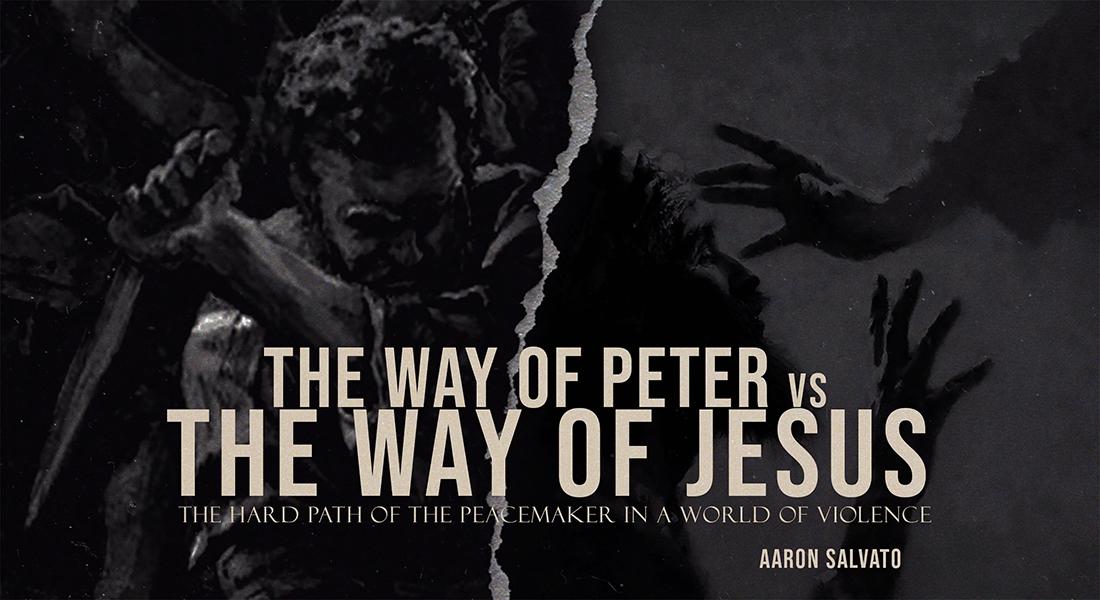
The way of Peter will always be more attractive to the flesh than the way of Jesus.
In a culture that despises any sign of weakness, cutting our enemy down feels much more productive than trying to heal them.
We see this play out the night that Jesus was arrested. Peter’s heart was in the right place. In the garden, Jesus was betrayed and surrounded by enemies. Ever the loyal disciple, Peter believed he needed to save Jesus. So Peter attacked a man, chopping off his ear.
Yet this display of aggression broke the heart of Christ.
Jesus told Peter, “put your sword away! He who lives by the sword dies by the sword!” Then, Jesus tended to the wound of the very man Peter had attacked … a man on the side of Jesus’ enemies.
Where Peter lashed out violently in defense of Jesus, the Savior’s attention was on healing an enemy who one of Jesus’ own followers had attacked.
The Way of Peter: Defensive Violence
In this age of deconstruction and what is called exvangelicalism, we are seeing a hostility towards the Christian church like never before.
Many former followers are now loudly and boldly declaring themselves enemies of Christianity.
Our response to this hostility, often, is the way of Peter.
We go on the defensive. Like Peter, we want to defend Jesus, our faith, and our way of life. So we lash out with our words. We are sarcastic. Cutting. Bitter. Jaded. Cynical. We mock those we disagree with. We take up our keyboards (digital swords) and wage war in comment sections.
We often judge people so quickly. All it takes is one wrong belief … and we instantly know they are an enemy who must be shut down swiftly.
We even go so far as to fight fire with fire. We respond to their memes and posts with our own memes and posts … mocking them for being SO wrong. Then we pat ourselves on the back for our “righteousness.”
“Thank You Lord that I am not like them” (Luke 18:9-14).
As if Jesus needs us to save Him. As if His mission wasn’t to save the lost… but rather, to save our offended egos.
The Way of Jesus: Enemy Love
Let me be clear. I’m not suggesting every person publicly criticizing our faith is a spotless lamb that needs to be coddled.
The reality is we are in a moment where there are enemies of the faith around every corner, daggers in hand, waiting to strike. Among the lost sheep there are certainly wolves. Enemies.
And what do we do with enemies? The world would say we should destroy our enemies. Jesus, however, declares that we must love them. We serve a master who declared enemy love to be a way of life. A very tough command from Jesus, but one that He has complete authority to give.
Because He didn’t just say it.
He lived it.
While we were His enemies, He hung and bled and died a brutal death for us. Purely out of love. Scandalous, offensive, radical love.
Now, the truth is that from His place hanging on that cross, He could have called down fire from Heaven to devour His enemies, and He would be completely justified in doing so! It would make for a great movie scene. We’d probably cheer! There’s something in us that thirsts for vengeance and loves seeing villains get their comeuppance.
However, we so easily forget two important things:
1. Jesus never tried to use violence to destroy His enemies.
2. We ourselves are the villains Jesus died for. Not just the Roman soldiers or Jewish religious leaders. It was our sins that drove the nails into the hands of Christ.
A wish for Jesus to destroy His enemies is a wish for Jesus to destroy … us.
Thank God we are not Jesus.
Thank God we are on the path to becoming more like Jesus.
Our savior-king is the strongest, most courageous, most incredible leader we could ever hope for! He modeled gentleness and compassion in the face of hostility and hate. When the time came for Him to die on the cross, He looked down at His enemies and said, “Father, forgive them.”
That’s not weakness in the face of adversity. That’s strength unlike any the world has ever seen. Jesus, our master and leader, calls us to this hard and courageous path of enemy love.
This is The Way.
The Way of the Peacemaker is a hard road
Enemy-love and peacemaking is an aspect of our call as Christians that I’m very passionate about. I believe it should be a central aspect of our identity. The strange reality is that in my time trying to practice these aspects of Christ-following, I have experienced great opposition, not from unbelievers, but from Christians!
This isn’t my unique experience. My friends and mentors who also take up the call to peacemaking and enemy-love have experienced the same opposition.
Sadly, many Christians tend to fall into the pattern of Peter, rather than Christ. One of the biggest criticisms I’ve heard of the peacemaker is that they show too much grace and patience to people in rebellion against God.
This has always baffled me, because personally, I’m nowhere near as patient as Jesus!
I wouldn’t hang on a Cross for my enemies.
My flesh wants to criticize and lash out, and I often fall victim to this mentality.
But Jesus is different. No one has more patience, kindness, grace, and long-suffering for sinners than Christ. His grace levels are off the charts.
Sometimes I feel that Jesus is the least paid attention to teacher in the Scriptures.
We want Jesus to save our souls but not teach us how to live.
“Love your enemy” is probably the most radical command, and therefore the most ignored, most rationalized, and most explained away. We can think of a million reasons why Jesus didn’t really mean what He said.
That night in the garden, Peter knew Jesus’ teachings on enemy-love. He was there when they first were preached. But to Peter, in that moment, enemy-love was not rational. It was not pragmatic. In Peter’s mind, enemy-love was not the solution. The only logical, rational solution was the sword. Violence.
Yet Jesus immediately corrects Peter: “He who lives by the sword, dies by the sword.”
Some treat Jesus’ words to Peter in that moment like they have as much power as a fortune-cookie fortune.
They say: “What a nice, idealistic statement. But that’s not how the real world works.”
So often we Christians forget Jesus calls us to be “not of this world.” Of course the methods of Jesus make no sense in this world! His Kingdom is an upside down one. He’s teaching us a new way to be human.
Jesus has this wild belief that He can save and heal His enemies.
The call to Christianity is not merely a call to believe Jesus can save us personally, but that He can save our enemies as well, and wants to involve us in the process.
Choose the hard path.
Exvangelicalism (former Christians boldly and publicly leaving the faith, often aggressively criticizing Christianity in public spaces) is having a moment. For those of us still in the faith, this feels horrible to watch and to experience …
It feels like Judas. A betrayal.
Especially since many who take this path actually position themselves as proud enemies of Christianity. This posture makes it very easy for us to go on the defensive. We lash out like Peter. Keyboard warriors for Jesus. However, we can easily do this without realizing our hostility can be what pushes a doubter/deconstructor over the edge!
Many in this camp are lost sheep, people who have been deeply wounded by a bad Church experience or abusive leadership. They are hanging onto their faith by a thread.
And so when we come along and treat them with arrogance, cruelty, or indifference, it just confirms in their mind what they’ve started to believe: Christians are not the community of love they claim to be. The struggling sheep then fall prey to the wolves who want nothing more than to destroy every last shred of faith in Jesus.
In our hostility and carelessness, we can unwittingly aid someone on their path of deconversion.
The great irony is that as Christians, though we may feel we are doing right by attacking enemies of the faith, in doing so we are abandoning the actual assignment we’ve been given by our King! “Go and make disciples.”
If we want to fight, let us fight to rescue the lost. If we want to wage war, let us wage war against all religious hypocrisy, all self righteousness, and all apathy/indifference to the call to love our enemies.
Let us work tirelessly to remove any obstacle in the way of someone coming to Christ.
This is the way of Jesus, the wounded healer.
Imagine knowing you are about to brutally die on a cross, yet taking the time to heal the wound of an enemy. That’s the lion-hearted master we serve.
In my younger days as a Christian, I know I wounded many in my desire to win debates and be seen as right at all costs. I’m so thankful Jesus can heal the ears of people I’ve attacked while trying to defend Him.
I believe Jesus isn’t calling us to be culture warriors, but culture medics. Hacksaw Ridge style.
To paraphrase Paul, “people aren’t the enemy, they are victims of the true enemy” (Ephesians 6:12).
The truth is … if any of my exvangelical friends are reading this, they are probably rolling their eyes, offended that I would say they are in bondage to an enemy they don’t believe in.
The Gospel is offensive enough that we don’t need to work hard to offend.
We offend because we don’t work hard. We take the easy path.
Jesus is calling us to something harder and more courageous: Enemy love. Going the extra mile (Matthew 5:40-45). Never compromising the truth we believe, but bending over backwards to show grace to those who don’t yet believe it or deserve it.
Why? Because we didn’t deserve grace either. Yet Jesus died for us.
Chose the hard path of enemy love.
Just because the Church has radical enemies doesn’t mean the Church isn’t called to radical enemy love.
The next time you feel inspired to lash out like Peter, stop, pray, and ask yourself:
“Lord, is it possible for You to use me as an instrument of healing?
Will you use me to help heal the ear of the wounded so they can once again hear Your voice?“









